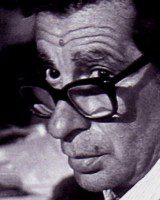Youssef Chahine on Confronting the Other
BY: DEENA SABRY
@DEENASABRY

However, the film could be seen as Chahine’s own political commentary at the time, which can be applied to the politics of contemporary Egypt.
In an attempt to create a discussion about how Chahine would have perceived Egypt’s contemporary political scene, the AUC Forum held a panel on Wednesday March 30 titled What Would Youssef Chahine Say?” in Prince Alwaleed Hall.
The speaker at the panel was Marwa Maziad, an AUC alumna and a fellow at the Middle East Center in the University of Washington, Seattle.
Maziad developed an interest in Chahine and his films at an early age. Other than working on an arts minor as an undergraduate student, she has conducted plenty of research about Chahine and his work.
She is currently working on a PhD on civil-military relations in comparison between Turkey and Egypt, inspired by Chahine’s own techniques of brainstorming.
The aim of the panel was not only to discuss Chahine’s portrayal of the political sphere, but also to discuss and analyze his ideas and creative film-making process.
Maziad shared an anecdote of when she was a high school student who came across an interview with Chahine as part of her schoolwork.
“He was talking about his relationship to the sea in Alexandria. He would ask who is the ‘other’ on the other [side] of the shore; who is sitting on the other side of where he is sitting,” said Maziad.
“I’m now doing my PhD and I was previously a faculty member in Qatar and Turkey, – so all over the place – and I have this idea of a man who was communicating with the ‘other’ on the other side the
Mediterranean” Mazaid added.
One thing Chahine was specifically known for was his wide international audience.
Although not all of his films at the time of their production made it to the box office or were popular within the Egyptian industry, he reached a wide international audience after co-directing 11’9”01 September 11.
Maziad elaborated that the reason Chahine was not as accoladed at the time among Egyptians as he was internationally is because he always spoke too soon.
By looking at and examining the characters in his 1972 film Al Asfour, it becomes apparent that Chahine was saying that the cause for the 1965 defeat lies within the Egyptian society, which was not an easy message to articulate following the war.
“The characters [in the film] are very complex and he was trying to say that the Egyptian society’s very complex self is what should be examined, not the “other” on the other side; not the war with Israel. That was a very difficult message to say between 1971 and 72 and that is why I argue that he
always spoke so soon and that is why he was not understood by others,” explained Maziad.
The fact that he was not always understood was a constant struggle he had that can be explained by his ability to foresee events before others.
“It’s almost as if he was blind. When you see things before others and you want to talk about them but nobody is registering; that is a struggle within itself,” added Maziad.
Maziad further explained that at times of a lack of political participation and a lack of political openness, filmmakers go back to their own lives and tell personal stories that are juxtaposed with a number of political and social messages.
“You cannot just make a statement about a huge political event right then and there. It is very difficult; the Turkish filmmakers in the 80s, after the military intervention, went and did their own thing. They started talking about those episodes in 2000s. You need the perspective of time if you are to make anything deep about political events,” she told The Caravan.
“The great films are the films that are your thing without talking about politics at all. They are your print in the political, cultural, and social realm,” Maziad said.
Chahine’s film is a clear-cut example of how this can be achieved. It is through avenues such as film that we can acquire an insight into the society at any given moment. And Mazaid is successful in bringing back the voice of Chahin’s unique take on Egyptian culture and its reactions to contemporary issues.



